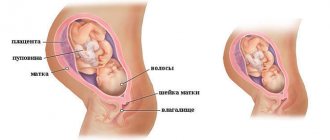Newborn baby: First 5 weeks of life
You're already five months into your baby's new life and you'll probably feel like time is flying by. As time passes, we're sure you have several questions about your baby's development. Here you'll find all the answers you need about what to expect when your baby turns five weeks old.
Here's what happens in week 5.
Feeding
By five weeks, your baby may need to adjust his feeding schedule. For exclusively breastfed babies, you may notice longer, more consistent feedings and fewer group feedings, which were more common in the newborn days.
Formula-fed babies may also need to increase the amount of formula they receive. As a rule, a child in the second month of life drinks about 120-150 grams. mixture with each feeding, every three to four hours during the day. Your baby may sleep longer at night, between four and six hours. There is no proven amount of formula that every baby needs at this age—every baby will be different, so pay attention to your baby's hunger cues to determine exactly how much your baby needs. You may consider increasing the amount of formula if your baby:
- He quickly finishes the bottle and seems to be looking for more
- He seems to want to eat more often, like every two hours when he was eating every three hours
- Wakes up more often to eat at night
- Doesn't gain weight well
On the other hand, if your baby seems to be constantly hungry and is not satisfied with formula feeding, you will need to talk to your baby's pediatrician to make sure you have adequate formula and there are no underlying medical conditions.
Your 5 Week Baby's Development
Newborn baby: First 5 weeks of life
Sleep Basics Newborns under 3 to 4 months of age need 14 to 17 hours of sleep per day, and typically wake up every two to four hours to feed.
Look who's Talking! Those cute grunts, gurgles and coos your baby makes are his way of communicating and experimenting with sounds.
Did you know? When babies imitate their caregivers' facial expressions, it also evokes emotions in them. Although your baby still cries a lot, he is also learning to communicate in other ways. These delightful grunts, gurgles and coos are his way of experimenting with his mouth, tongue and throat, discovering what combination of actions produces what sounds.
The best way to encourage your sweet companion to communicate is to keep the conversation going. So come on, coo and gurgle back! Matching "coo-na-co-coo" will give your cutie extraordinary satisfaction and encourage verbal exploration that will eventually lead to that first meaningful "mama" or "dada."
And while it's important to speak your child's language, it's also important to speak your language. Babies learn by imitation, so be sure to talk up a storm, keeping the conversation going while you're changing diapers ("What cute little toes!"), while you're walking ("It's such a sunny day!"), and while shopping ("That red tomato looks so delicious!"
Of course, your child has no idea what you're talking about—yet. But she soaks up every syllable you say, and hearing you speak is the best way to help your baby develop speech.
Is your baby not cooing yet? Not to worry. Some babies enjoy the verbal department, and that's okay too. Your baby will start talking to the baby over the next few months.
What's New in a Growth Spurt at 5 Weeks?
From now on, your baby will no longer sleep all the time. You'll notice that between feedings this little guy doesn't mind having fun! For now, the waking time is only 20-30 minutes, so try not to overload the baby’s psyche. After the crisis, a month-old baby will certainly begin to surprise you:
- He will begin to look at various objects longer and more often. It's time to get out the first toys! But no more than 1-2 at a time.
- The baby listens more and reacts to different sounds in different ways. Previously, he didn’t give a damn about them, to put it mildly.

- Enthusiastic sounds and sounds signaling dissatisfaction appear. I heard that kids pronounce consonants when they are happy, and vowels when they are dissatisfied with something.
- The child smiles much more. And finally, he does this not only in his sleep, but also dedicates his smile to you personally!
- Now the baby will cry with tears. Just in time for the age of 5 weeks, the tear ducts open. Oh, it would be better if they cried without tears, by God! No mother's heart can stand...
- Feels touch more clearly. Plus, he likes them, so provide your baby with as much physical contact as possible.
Quite a list of achievements in such a short time! We have the power to alleviate the temporary suffering of our children. A growth spurt of 5 weeks is just the beginning of a long, difficult, but incredibly interesting journey. Everyone has been through this. Remember how important your mission is - helping a new person grow and develop! What could be more important? Strength and patience, friends. All your efforts will pay off in full.
In the following articles I will talk about other crises in the life of a baby, so subscribe to blog updates so you don’t miss anything. I also highly recommend studying the calendar of age-related crises for a child up to one year old in order to be fully prepared. See you soon!
0
0
Ekaterina Ulyanova
Mother of two wonderful daughters and author of the blog blogomamochka.ru
How should a 5 week old baby develop cognitively?
Your baby's ability to focus should now improve and he may be able to focus both eyes on the same object. You may notice that they are more interested in complex colors and patterns as they begin to see more detail in the world. Of course, their memory is still developing, so they quickly forget the objects they were able to focus on. However, they are sure to remember your voice and smell now, so keep cuddling and talking to them in some soothing child-like way.
5 Week Baby Milestones
Your baby's nervous system is still adjusting to life outside the womb, so it may take up to 16 weeks for evening irritability to subside.
1) Raise your head
Your baby's neck becomes stronger, which means he is finally holding his head up. Sure, it's likely only for a few moments while they're on their tummy or sitting in their car seat, but it's still a milestone to be proud of. What injections should a 5-week-old baby receive? You still have three weeks to prepare for this as babies don't need shots until they are two months old. In the meantime, here are some tips on how to calm your child during routine vaccinations.
How long should a 5 week old baby sleep?
Since your baby is much more alert—he'll now likely be awake for about ten hours a day, as opposed to six in previous weeks—it's a great time to start establishing a sleep routine, as you definitely need some rest. by now! You can help them understand the difference between day and night by taking simple steps, such as keeping the house bright and noise levels normal during the day. Of course, every child is different and what works for one may not work for your child, so you need to find the right routine.
How much should a 5 week old baby eat?
Since this week is meant for growth spurts and improved cognitive abilities, finding your baby hungry is normal. Follow the general advice to feed 150-200ml per kilogram of their weight, but be sure to follow your baby's instructions - they will still know how much food is appropriate for them at this stage.
If you're breastfeeding, this may also be a good time to consider pumping. It's best to wait until your baby is used to breastfeeding before introducing a new option, but hopefully after five weeks you'll be able to figure it out. If you're still struggling, seek medical help and check out these top tips and answers to these breastfeeding FAQs from lactation expert Sioned Hilton.
5 week old baby: how to cope with colic
Colic is defined as uncontrollable crying for several hours at a time three times a week for at least three weeks. If you're struggling with colic, know that you're not alone and doing nothing - in fact, it's a condition that affects up to 40% of babies. Visit your doctor and read our top tips for helping your baby cope with colic.
How much should a 5 week old baby pee?
It may seem obvious, but as the amount of food increases, the amount of feces increases! If you're more concerned about what they chew than how much, we have a great poo color chart you can study.
What problems should parents of a 5-week-old baby be aware of?
Constipation : Does all that extra food seem like it's going to go nowhere? Your child may be constipated. Watch for loss of appetite, crying, and discomfort before urinating, less than three bowel movements per week, or dry, hard stools. If you notice these things, contact your GP. Lack of sleep : Is interrupted sleep disturbing? Check out our list of energy-boosting foods and find out how to mask those sleepless nights with incredible shilajit shopping. No one will blame you for looking and feeling exhausted, but it can give you a boost of energy for those extra long days. Postpartum depression : Once childhood depression is truly a thing of the past, you should start to feel more stable in your hormones. However, if you feel overwhelmed by the feeling that everything could go wrong and it's all your fault, you may be experiencing postpartum depression. This happens to every tenth woman, and there is nothing to be ashamed of. If you are concerned, talk to your doctor.
Sound familiar?crisis 5 weeks
For the third day now, my daughter has been sleeping during the day only in her arms, she’s being capricious. I didn’t understand what was going on - we poop well, our tummy is normal, we eat too (there’s a lot of peeing). But as soon as you put her in bed or in a stroller, the baby immediately wakes up and demands to take her in his arms again. She can sleep in her arms for 3 hours (thanks to the sling). Previously, there were no problems with putting her to sleep at all. On a walk, too: she sleeps for an hour, then screams. Although a couple of days ago we walked for 2.5 hours without any problems. I have already become sin on the full moon or a change in weather. But then I came across it on the internet. Do you know this, our peers?
Information below
The joys and sorrows of the fifth week Around the fifth week, sometimes as early as the fourth, your baby's development takes its first leap. His sense organs begin to develop rapidly. The child notices that something new and unfamiliar is happening in his world. He is confused, screams and wants to go back to the thing he trusts most - his mother. At this age, all children seek more physical contact and attention than usual. Therefore, it is normal that you notice that your child also “demands” this from you. These increased demands on mom can last one day or a whole week. Leitmotif of the jump: back to mom Your child feels that something has happened, but cannot tell you anything, cannot turn to you, cannot reach out to you with his little hands. But he may well scream at the top of his lungs and become more restless than in normal life. For such a young child, this is a kind of way of letting you know that he is “out of line.” He drives the whole house crazy with his whining, screaming and squealing. The cry gives the child hope that his mother will come to him now and will not leave again. The child sleeps worse. At least when he lies alone in his crib. Sometimes a child wants to lie on his stomach, although he could not stand it before. This seems to give him the feeling of belly-to-belly contact and security he needs right now. Screaming makes mothers insecure All mothers diligently search for the causes of these screaming attacks. They check to see if the child is hungry, watch to see if anything is pulling or pressing, and wash him. They try to calm their child and quickly notice that this cry is not pampering. In addition, you will notice that the child, once calmed, very quickly falls back into an unnerving cry. For most mothers, sudden changes in a child's behavior are new and unpleasant. She worries, feels insecure, and has many fears. Often mothers are afraid that their child is missing something, something hurts, something is wrong in his little body. Others are afraid that they do not have enough milk - the baby constantly demands the breast and seems to be constantly hungry. Some of the mothers we interviewed even took their children to the doctor - the children turned out to be completely healthy. Mom's closeness relieves tension. Since the child feels that something has changed, he needs a feeling of security. Give him as much of it as you can. Everything matters - your smell, your warmth and voice, the way you hold the child to which he is accustomed. He gets better with you. You give your child a feeling of confidence, warmth and security during these difficult times. What is important to know? It is completely normal for a child to require the breast more often when he or she is experiencing a developmental leap. When you breastfeed him, everything is fine. Your child is confused, he is looking for affection and consolation. Many mothers don't know this. Many people turn to feeding specialists when a difficult period drags on. Mothers would like to continue breastfeeding, but doubt that they have enough milk. Expert advice: be sure to continue feeding these days. In addition to the sixth week, mothers also often turn to feeding specialists in the third and sixth months. It is noteworthy that it is at this age that children experience leaps in development.
The leap is in full swing Many things indicate that around 4-5 weeks, babies are going through a process of rapid maturation, starting with metabolism, affecting the internal organs and extending to the senses. This is how babies at this age cope with digestive problems that they previously had. On the other hand, another “functional problem” that existed before, but is now becoming more noticeable, may become more pronounced. If a child has pylorus stenosis(?) (Pylorusstenose - German), then this means the following: the connecting opening between the stomach and intestines, which is already quite narrow from the very beginning, can finally close. Because of this, the child cannot hold down food. Every time he (emphasized in bold, since from time to time such regurgitation is typical for this phase, but does not indicate a disease, being precisely a property of this developmental leap. lane) he regurgitates food along a large trajectory. A small surgical intervention, fortunately, helps solve this problem. The child's metabolism also changes at this age. Tears appear much more often, sometimes for the first time in my life. In addition, mothers notice that their baby is more awake. Everything indicates that the senses are developing very quickly. Children are noticeably more interested in the world around them. Not surprisingly, he can now focus his eyes over a greater distance. Immediately after birth, he could clearly see objects at a distance of no more than 20 centimeters. For a child, these are new impressions, a new experience. He wants new experiences, and therefore is more demanding of external stimuli. At the age of 5-6 weeks, the child will happily “try” to diversify his impressions. In one laboratory experiment, children were shown a color film of a mother playing with her baby, during which they suckled. As soon as they stopped sucking, the picture disappeared. Since it is difficult for children at this age to watch and suck at the same time, they were only able to watch a small fragment of the film each time. And when the experiment was done the other way around, i.e. In order for the film to be shown, the children had to stop sucking, then they “preferred” to watch the film. Working with the head Around 3-4 weeks, the volume of your baby's head increases sharply and glucose metabolism changes. The rapid development of sensory organs does not mean that the child has new capabilities. He cannot process impressions from his senses the same way adults do. Even more, he loses a certain part of the information. The innate love to follow a schematically drawn face with your eyes disappears. Turning the head towards the sound and imitation of facial movements also disappear. This indicates that these primitive reflexes were controlled by subordinate areas of the brain and are only now being reassigned to control areas of the brain. What's new in your child's behavior The child shows more attention to his surroundings: - looks at something longer and more often - listens more often and more attentively - reacts more clearly to touch - reacts more clearly to smells - smiles for the first time (or simply much more often) - produces more joyful sounds - shows that he likes or is bored with something - it becomes more often noticeable that he knows what is happening - stays awake and active longer
Source: https://malyshi.livejournal.com/451985.html
Your 5 week old baby's growth
Your baby is growing by leaps and bounds... or rather, by ounces. The average 5 week old baby will weigh somewhere in the 4300kg range, but remember this range is wide, don't forget many babies are born weighing 4300kg.
Be sure to measure your baby's height in relation to his own, and not the height of other babies. If your doctor is happy with your baby's weight, you should be too.
Health of your 5 week old baby
Baby Sleep Here's some good news for sleep-deprived parents (aren't all new parents sleep-deprived?). Your baby is slowly starting to understand the difference between day and night, which means more of those zzz's will be caught when it's dark outside. However, your cutie will spend a lot of time napping (giving you a chance to get some rest during the day). Expect your little dreamer to sleep between 14 and 17 hours over a 24-hour period, splitting up to about 8 to 9 hours at night (though not necessarily all at once) and 7 to 9 hours during the day (about 3 to 5 hours). dozes).
Does your child have acne?
Although your baby gets plenty of rest, his skin may not look quite as baby-like yet, as do all the baby pimples and tiny whiteheads on his adorable face. These spots are common (affecting about half of all babies), but they are also temporary and go away within a few weeks or months. They're also not a sign of future acne problems, so breathe a sigh of relief. The best treatment right now is no treatment at all. Your baby's face will instantly look clear and smooth.
Children's smiles and sounds
By 5 weeks of age, when the corners of your baby's mouth curl up, you can confidently attribute it to an actual social smile (unless, of course, you detect that telltale smell that means it's time for another diaper change). And who better to practice those first smiles than mom? (Yes you are!)
So keep interacting with your baby in the same way (little things that mean a lot - like talking, singing and cooing to him) and you will have a lot to smile about.
Your 5-week-old baby will now be smiling at something else: music - whether it's singing while you change a diaper or the radio humming in the background.
Your baby is also acutely aware of other sounds, such as bells, barking dogs, vacuum cleaners, and whistles. She may enjoy kicking these sounds, screaming, or calming down to listen better (much depends on whether these sounds became habitual in the womb).
Just be sure to take note of what sounds best soothe your baby so you can recreate them when you need it most!
Less stress about food
First things first: stock up on staples. Stock your pantry and refrigerator with items like low-sodium chicken broth, whole grain breadcrumbs, olive oil and eggs. This will make your weekly grocery shopping trip easier to manage. Plus, knowing you have key ingredients on hand before you start cooking makes the process much easier.
Milk allergy in infants
When an infant has a milk allergy, the baby's immune system reacts negatively to the proteins in cow's milk. If a baby is breastfed, he reacts to the dairy products his mother ate (milk proteins pass through breast milk), and if a baby is formula fed, he reacts to cow's milk proteins in the formula.
In either case, the immune system views cow's milk proteins as foreign substances, and in its efforts to repel the invaders, the body releases histamine and other chemicals that cause allergic symptoms in the body.
Symptoms of a milk allergy in infants include: frequent spitting up, vomiting, signs of abdominal pain, diarrhea, blood in the stool, failure to gain weight, hives, scaly skin rash, cough or wheezing, watery and stuffy nose, difficulty breathing, or even anaphylaxis (which constitutes a life-threatening allergic reaction and requires immediate medical attention, 911 and/or a trip to the emergency room).
If your baby has symptoms of a milk allergy, see your pediatrician, who will likely perform a physical exam and examine your baby's stools, discuss your family's history of allergies, and/or maybe even perform a skin test.
Baby acne
If you thought before puberty you were worried about spots dulling your loved one's skin, think again. About 40 percent of babies develop acne, which usually appears between 2 and 3 weeks of age and usually goes away by 6 months of age.
Baby acne is caused by mom's hormones that are still circulating in the baby's bloodstream. Those pimples creeping up on your little one's squeaky clean skin aren't pretty, but the good news is that they're harmless and don't leave permanent scars—just resist the urge to squeeze them or apply creams.
The best solution is to keep the area clean (with just water) and let the pimples go away on their own (which they will soon do).
What should a baby be able to do at the age of 8 weeks (development in the 2nd month of life)
Basic motor skills Some babies can begin holding their head as early as 2 months. On average, this skill appears at 3 months.
Emotional reactions. Communication with an adult From 2 months of life you can already talk about a conscious smile.
Speech development As the child approaches the age of 8 weeks, the nature of his humming changes. If previously these were weak guttural sounds, now he is able to pronounce some vowels.
Indicative reactions can be expressed in turning the head in the direction from which the child heard the sound.
See here the weight and height standards for a boy aged 8 weeks (2 months).
See here the weight and height standards for a girl aged 8 weeks (2 months).
Your belly after baby
Even if you didn't gain a lot of excess weight during pregnancy, and even if you lost most of your post-pregnancy weight in the hospital, the postpartum bump will likely linger for at least a month or more after delivery. And that's okay—after all, your skin is elastic, but it's not spandex, and your uterus has simply stretched from the size of a pear to the size of a watermelon. So it will take some time to get back to stone fruit size.
In fact, you'll likely experience abdominal cramps in the first few days after giving birth; This is your uterus contracting as it begins to contract. In addition, the abdominal muscles are stretched to make room for the baby.
Just remember, don't do crunches until your doctor gives the go-ahead, especially if you had a C-section.
Strawberry hemangiomas
These soft, raised strawberry-like appearances, which often appear on your baby's head, chest or upper back, are extremely common in babies and usually disappear between ages 5 and 10, if not by preschool age.
From the size of a freckle to a drinking mat, these bumps form during fetal development when immature veins and capillaries break away from the circulatory system.
It is best to let the hemangioma go away on its own, but if it continues to grow, bleeds spontaneously or becomes infected, or if its location interferes with the child's vision or ability to eat, contact your doctor.
The simplest treatment is compression and massage, which can speed up the disappearance of the mole. More aggressive treatments include steroids, surgery, laser therapy, cryotherapy (freezing), and hardener injections. Talk to your pediatrician to find out which option is best for your child.
What happens to the child?
The fetus is not yet quite like a small child. Its weight is only one gram, and its height is 1.5-2 mm. Nevertheless, important changes occur in this tiny organism, and internal organs are intensively formed.
- The embryo already has the rudiments of limbs and even fingers, the cochlea of the inner ear, eyes and mouth are formed. At this stage, cells begin to form that are responsible for the sex of the child.
- The spine and internal organs such as the liver, intestines, and pancreas are intensively formed, and the digestive and urinary systems are formed.
- The cardiovascular system develops, the first blood vessels appear. By the middle of the fifth week, the tiny heart is beating at about 100 beats per minute. Over time, contractions will reach 180 beats.
- The development of the nervous system begins, tissues of the spine and spinal cord appear.
At this time, the placenta is actively developing - one of the most important and unique organs that exists only during pregnancy. The placenta connects the mother and the unborn child, providing the latter with all the necessary nutrients. Such a close connection between mother and baby through the placenta is a reason to reconsider your work and nutrition regime and give up bad habits.
Do not forget that the fifth obstetric week coincides with the third embryonic week, that is, the real age of the baby is two weeks less.
Prenetix is a way to find out
the risk of chromosomal abnormalities
from the 10th obstetric week. Recommended for every pregnant woman. Duration of two days!
More details
Birth control while breastfeeding?
If you're breastfeeding, you've probably heard that breastfeeding can serve as a form of birth control—and while that's not entirely true, there's more to it.
Breastfeeding offers some protection - to a certain extent. Exclusive breastfeeding, which involves breastfeeding at least once every four hours during the day and at least once every six hours at night for the first six months after birth until menstruation returns, is called lactational amenorrhea (LAM). It is considered a form of birth control if all criteria are met.
However, breastfeeding beyond these criteria, especially when the mother is taking formula or solid foods and her period has not yet returned, does not provide the same contraceptive protection.
For this reason, your OB/GYN will likely suggest you switch to a different type of birth control if you are not actively trying to get pregnant.
Explore Further: Week 6









